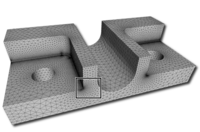Particle systems for adaptive, isotropic meshing of CAD models

|
We present a particle-based approach for generating adaptive triangular surface and tetrahedral volume meshes from CAD models. Input shapes are treated as a collection of smooth, parametric surface patches that can meet non-smoothly on boundaries. Our approach uses a hierarchical sampling scheme that places particles on features in order of increasing dimensionality. These particles reach a good distribution by minimizing an energy computed in 3D world space, with movements occurring in the parametric space of each surface patch. Rather than using a pre-computed measure of feature size, our system automatically adapts to both curvature as well as a notion of topological separation. It also enforces a measure of smoothness on these constraints to construct a sizing field that acts as a proxy to piecewise-smooth feature size. We evaluate our technique with comparisons against other popular triangular meshing techniques for this domain. |
[DOI/EE link]
@inproceedings{BLW10,
address = {Chattanooga, TN},
author = {Jonathan R. Bronson and Joshua A. Levine and Ross T. Whitaker},
booktitle = {19th International Meshing Roundtable},
ee = {http://dx.doi.org/10.1007/978-3-642-15414-0_17},
month = {10},
note = {Best Paper Award},
pages = {279--296},
publisher = {Springer},
title = {Particle systems for adaptive, isotropic meshing of {CAD} models},
year = {2010}
}